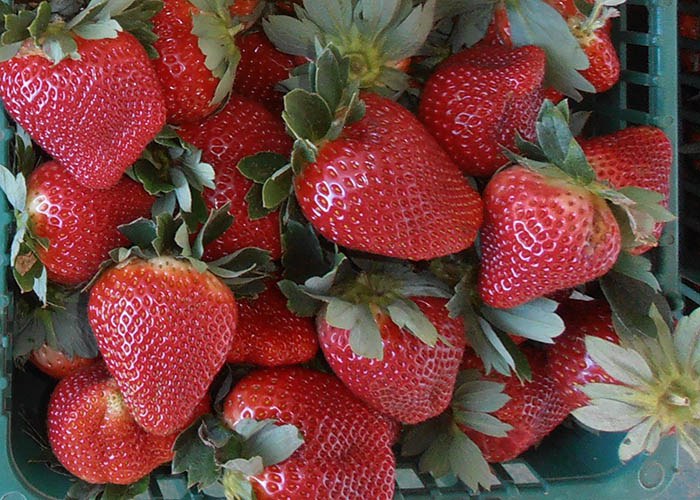NATIONAL SYMPOSIUM
Share via Facebook Share via TwitterLink to Copy to Clipboard
Posted on 04/20/2022 16:09
Strawberry in integrated production promotes sustainable development and is a differential of certified producers
Technical production standards are tested and validated by application in pilot units - Photo: Cristina Tordin/Embrapa
Red, large, and nutritionally balanced strawberries lure shoppers to fruit and vegetable shelves. But it's not just the physical characteristics of the product that matter. Knowing where the product came from, how it was grown, by whom it was harvested and packaged and how it got to commercial establishments are also preponderant criteria in the choice of the most attentive consumers.
Raising the quality standards of strawberries with added value, allowing the traceability of all stages of production, is just one of the advantages of an integrated production, since the benefits are also presented to the producers. In the field, production integrated to the specific cultivation environment reduces production costs; allows environmental conservation; it brings security to rural workers, profitability of the crop and greater regional development.
The win-win scenario in integrated strawberry production (PIMo) was discussed at the IX National Strawberry Symposium on Tuesday (19/04), held virtually with Embrapa's Youtube broadcast.
The production of strawberries in this proven system of research and innovation based on good agricultural practices allows for the socio-economic and environmental integration of the region. Thus, if the producer chooses to strictly follow the technical criteria developed from application in pilot units, he will have a differentiated market for his production, being able to receive the Brazil Certified seal: Agriculture of Quality.
This is how, in May 2019, the Paraná producer Ingrid Souza certified her integrated strawberry production, becoming the first female producer to receive PIMO certification. Her farm was also the pioneer in the state to receive the seal for the production of strawberries.
Whether in the field or in the consumer market, it has proven the advantages of production in an integrated system. The Pinhalão brand sells fresh strawberries in natura, dehydrated or freeze-dried. In this last process, water is removed from the strawberry in natura, preserving the nutrients of the food and leaving the strawberries crunchy. For a serving of 10 grams of freeze-dried strawberry, 130 grams of fresh strawberry go through this process.
It was to meet these other products made from fresh strawberries that the Federal Government, through the Ministry of Agriculture, Livestock and Supply, recently updated the technical regulations in order to meet Inmetro's Ordinance 443/2011, which sets out the requirements of conformity assessment for IP Brazil.
In addition to Paraná, two other producers in Rio Grande do Sul and a group of producers in São Paulo have their strawberry production integrated into the local regional environment in an environmental, economic and social way. PI organizes the activity of the production system according to the region, respecting its ecological functions in order to promote sustainable development.
For the coordinator of Integrated Agricultural Production at the Ministry, Rosilene Souto, this production system stands out as a tool for adapting to the economy of natural resources and inputs such as fertilizers.
How does integrated production (IP) work?
Technical production standards are tested and validated by application in pilot units. In this process, the most appropriate technologies are used, seeking the rationalization of agrochemical products, monitoring of water, soil, culture, post-harvest and the implementation of records in all stages of production to obtain traceability.
At the end of the work, all the guidelines established for the Integrated Production system will be available to producers: specific technical standards, agrochemicals grid, checklists, field notebooks, post-harvest notebooks and agro-industrialization notebooks, all approved and approved by the Federal Government, through the Ministry of Agriculture.
Adherence to the producer's is voluntary, but those who choose to follow the integrated production model must follow all the criteria established in the technical standards, as well as Tiago Andreazza , from Caxias do Sul, in Rio Grande do Sul.
On the market shelves, Tiago's and Ingrid's products are recognized by consumers based on the Brazil Certified seal: Quality Agriculture. The certification is part of the Conformi Assessment Program
.

 Mr. Alessandro Jacob speaking about Brazilian Law on "International Bar Association" conference
Mr. Alessandro Jacob speaking about Brazilian Law on "International Bar Association" conference